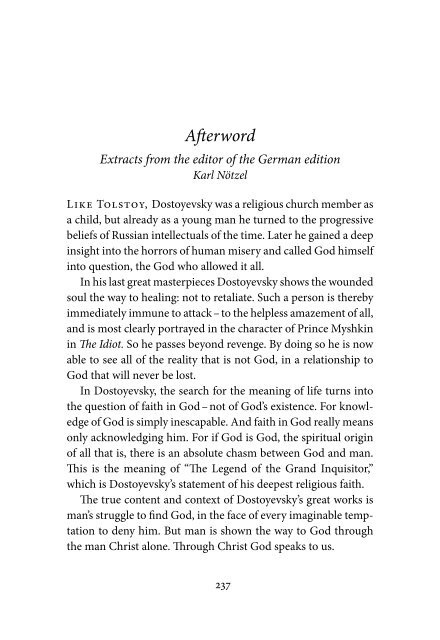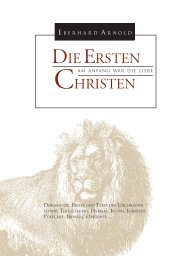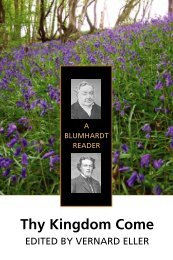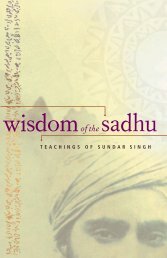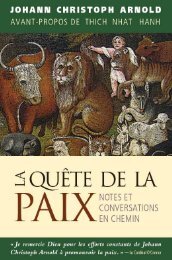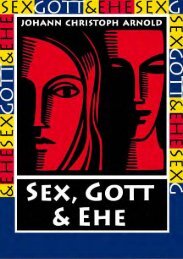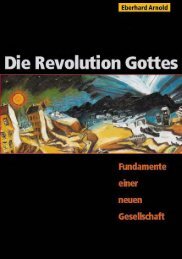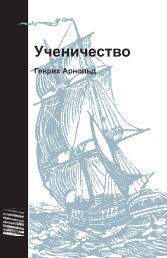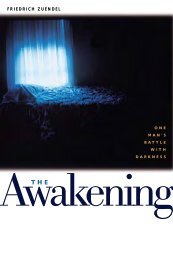- Page 2:
The Gospel in Dostoyevsky
- Page 5 and 6:
Published by Plough Publishing Hous
- Page 7 and 8:
Reprieve and Execution 128from The
- Page 9 and 10:
ForewordLike so many of my generati
- Page 11 and 12:
Foreword xiof a universal brotherho
- Page 13 and 14:
xiv The Gospel in DostoyevskyAlyosh
- Page 15 and 16:
xvi The Gospel in Dostoyevskythe gr
- Page 17 and 18:
xviii The Gospel in Dostoyevskythe
- Page 19 and 20:
xx The Gospel in DostoyevskyIt is t
- Page 21 and 22:
xxii The Gospel in Dostoyevskythrou
- Page 23 and 24:
xxiv The Gospel in Dostoyevskyone u
- Page 25:
Faith in God
- Page 29 and 30:
The Legend of the Grand Inquisitor
- Page 31:
The Legend of the Grand Inquisitor
- Page 34 and 35:
10 The Gospel in DostoyevskyYet in
- Page 36 and 37:
12 The Gospel in Dostoyevskyare mir
- Page 38:
14 The Gospel in Dostoyevskywere of
- Page 41 and 42:
The Legend of the Grand Inquisitor
- Page 43 and 44:
The Legend of the Grand Inquisitor
- Page 45 and 46:
RebellionIn The Brothers Karamazov,
- Page 47 and 48:
Rebellion 25gods.’ They go on eat
- Page 49 and 50:
Rebellion 27we prefer beating - rod
- Page 51 and 52:
Rebellion 29“That pamphlet is tra
- Page 53 and 54:
Rebellion 31sound sleep could be tr
- Page 55 and 56:
Rebellion 33stands on absurdities,
- Page 57 and 58:
Rebellion 35thy ways are revealed.
- Page 59 and 60:
Rebellion 37all, because he gave hi
- Page 61 and 62:
The Devil 39nature of Ivan’s illn
- Page 63 and 64:
The Devil 41intervals they receive
- Page 65 and 66:
The Devil 43to take me for somethin
- Page 67 and 68:
The Devil 45become superstitious. P
- Page 69 and 70:
The Devil 47tie, gloves, though I w
- Page 71 and 72:
The Devil 49is a letter of thanks i
- Page 73 and 74:
The Devil 51existed forever - but I
- Page 75 and 76:
The Devil 53“Much more than that.
- Page 77 and 78:
The Devil 55tree that, sitting on i
- Page 79 and 80:
The Devil 57an instant! It was natu
- Page 81 and 82:
The Devil 59and the other, my own.
- Page 83 and 84:
The Devil 61it! That’s all very c
- Page 85 and 86:
The Failure of Christendom 63second
- Page 87 and 88:
The Failure of Christendom 65“But
- Page 89 and 90:
The Failure of Christendom 67it exp
- Page 92 and 93:
The Story of MarieThis story is tol
- Page 94 and 95:
The Story of Marie 73unhappiness eq
- Page 96 and 97:
The Story of Marie 75turns, as thei
- Page 98 and 99:
The Story of Marie 77But the childr
- Page 100 and 101:
The Story of Marie 79“What delica
- Page 102 and 103:
The Story of Marie 81to carry it th
- Page 104 and 105:
The Story of Marie 83am able to see
- Page 107 and 108:
A Fool for Christ 87photograph. The
- Page 109 and 110:
A Fool for Christ 89door and again
- Page 111 and 112:
A Fool for Christ 91“Why, are you
- Page 113 and 114:
A Fool for Christ 93voices were tal
- Page 116 and 117:
96 The Gospel in Dostoyevskymore an
- Page 118 and 119:
98 The Gospel in Dostoyevsky“You
- Page 120 and 121:
100 The Gospel in Dostoyevsky“And
- Page 122 and 123:
102 The Gospel in Dostoyevskyfound
- Page 124 and 125:
104 The Gospel in Dostoyevsky“Why
- Page 126 and 127:
106 The Gospel in Dostoyevsky“Bea
- Page 128 and 129:
108 The Gospel in Dostoyevskymy lac
- Page 130 and 131:
110 The Gospel in DostoyevskySonia
- Page 132 and 133:
112 The Gospel in Dostoyevskylvanov
- Page 134 and 135:
114 The Gospel in Dostoyevskyand lo
- Page 136:
116 The Gospel in Dostoyevsky“Now
- Page 139 and 140:
120 The Gospel in Dostoyevskybefore
- Page 141 and 142:
122 The Gospel in Dostoyevsky“I d
- Page 143 and 144:
Hymn of the Men UndergroundThese wo
- Page 145 and 146:
126 The Gospel in Dostoyevsky“Yes
- Page 147 and 148:
Reprieve and ExecutionThese two ext
- Page 149 and 150:
130 The Gospel in Dostoyevsky“Not
- Page 151:
132 The Gospel in Dostoyevskyto the
- Page 154 and 155:
136 The Gospel in Dostoyevskythe pi
- Page 156 and 157:
138 The Gospel in Dostoyevskycautio
- Page 158 and 159:
140 The Gospel in Dostoyevskykopeck
- Page 160:
142 The Gospel in DostoyevskyEgypti
- Page 163 and 164:
The Last Judgment 145and shall stan
- Page 165 and 166:
The Crucifixion 147a look of suffer
- Page 167 and 168:
From the Life of the Elder ZossimaT
- Page 169 and 170:
From the Life of the Elder Zossima
- Page 171 and 172:
From the Life of the Elder Zossima
- Page 173 and 174:
From the Life of the Elder Zossima
- Page 175 and 176:
From the Life of the Elder Zossima
- Page 177 and 178:
From the Life of the Elder Zossima
- Page 179 and 180:
From the Life of the Elder Zossima
- Page 181 and 182:
From the Life of the Elder Zossima
- Page 183 and 184:
From the Life of the Elder Zossima
- Page 185 and 186:
From the Life of the Elder Zossima
- Page 187 and 188:
From the Life of the Elder Zossima
- Page 189 and 190:
From the Life of the Elder Zossima
- Page 191 and 192:
From the Life of the Elder Zossima
- Page 193 and 194:
From the Life of the Elder Zossima
- Page 195 and 196:
From the Life of the Elder Zossima
- Page 197 and 198:
From the Life of the Elder Zossima
- Page 199 and 200:
From the Life of the Elder Zossima
- Page 201 and 202: From the Life of the Elder Zossima
- Page 203 and 204: From the Life of the Elder Zossima
- Page 205 and 206: From the Life of the Elder Zossima
- Page 207 and 208: From the Life of the Elder Zossima
- Page 209 and 210: The Wedding at Cana 191youth on the
- Page 211 and 212: The Wedding at Cana 193days the peo
- Page 214 and 215: The Wedding at Cana 197Something gl
- Page 216: Life in God
- Page 219 and 220: 202 The Gospel in Dostoyevsky“You
- Page 221 and 222: 204 The Gospel in Dostoyevskyeven u
- Page 223 and 224: 206 The Gospel in Dostoyevskywonder
- Page 225 and 226: 208 The Gospel in Dostoyevskymuch m
- Page 227 and 228: 210 The Gospel in Dostoyevskyin the
- Page 229 and 230: 212 The Gospel in Dostoyevskyand di
- Page 231 and 232: 214 The Gospel in Dostoyevskythey t
- Page 233: 216 The Gospel in Dostoyevskywhen I
- Page 236 and 237: 220 The Gospel in Dostoyevskytime c
- Page 238 and 239: 222 The Gospel in Dostoyevskyand se
- Page 240 and 241: 224 The Gospel in Dostoyevskyin our
- Page 242 and 243: 226 The Gospel in Dostoyevskyno dou
- Page 244 and 245: 228 The Gospel in Dostoyevskythem:
- Page 246 and 247: 230 The Gospel in Dostoyevskybut on
- Page 248 and 249: 232 The Gospel in DostoyevskyWhen h
- Page 250 and 251: 234 The Gospel in Dostoyevskythose
- Page 254 and 255: Fyodor DostoyevskyBiographical Sket
- Page 256: Other Titles from PloughGod’s Rev


